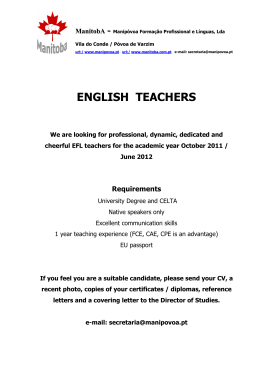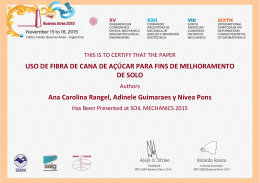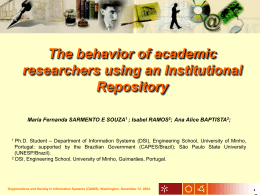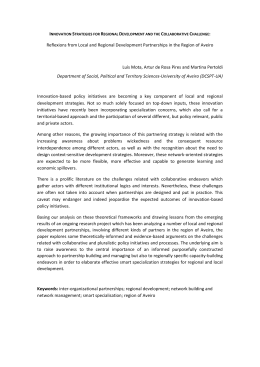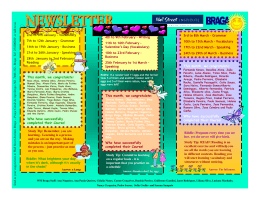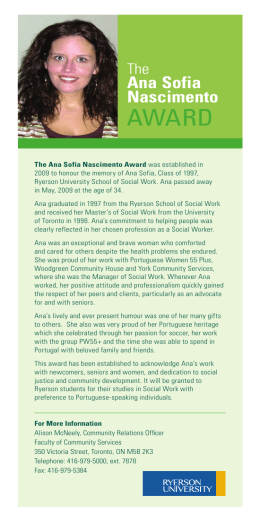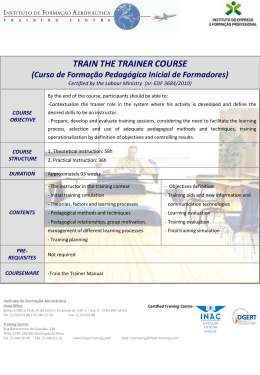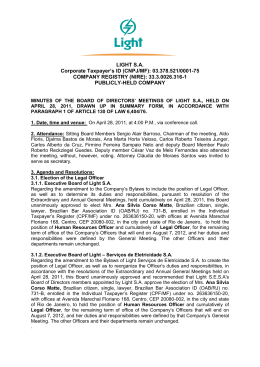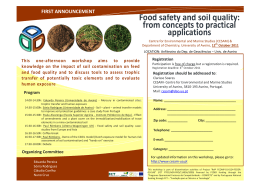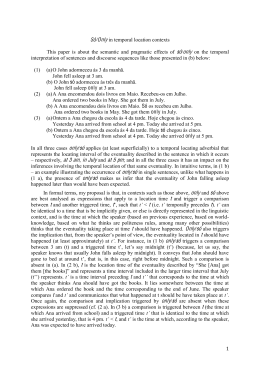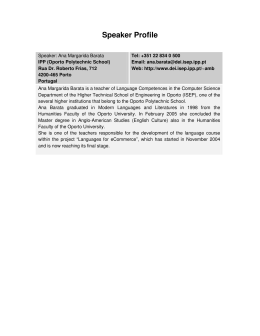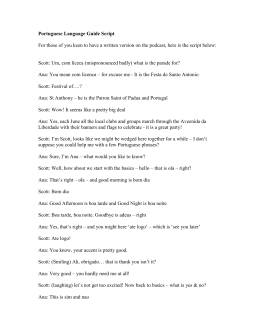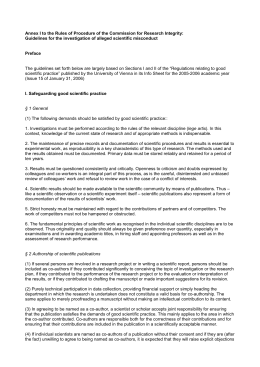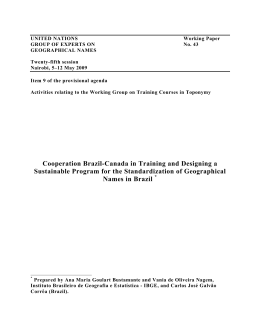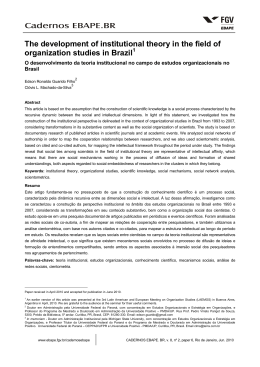LanQua Toolkit: example of practice Title of example of practice: Collaborative Professional Development in Language Education Author (i.e. details of LanQua partner submitting proposal): Name: Gillian Moreira LanQua sub project: Language Teacher Education Institution: University of Aveiro Tel: 351 916149223 Email: [email protected] Contact details for example of practice: Name: Gillian Moreira Tel: 351 916149223 Email: [email protected] Website: Institution and initiating department/faculty (i.e. where example of practice takes/took place): University of Aveiro / Department of Didactics and Educational Technology Departments/faculties in which initiative implemented/to be implemented: University of Aveiro / Department of Didactics and Educational Technology Abstract (QA question: What are/were you trying to do?) This case is a central component of a three‐year project funded by the Portuguese National Foundation for Science and Technology entitled Education and Languages: constructing and sharing professional knowledge. This project is based on the idea that the sharing and construction of professional knowledge amongst practising language teachers and teacher trainers/researchers can enrich language education in general and contribute to a renewal of practice. During the second year of the project, collaborative professional workshops were organised around specific topics, namely: sensitizing for linguistic and cultural diversity; teaching writing skills; and teaching reading skills. Around 70 teachers and researchers took part in this programme which was accredited by the Portuguese National Professional Development Agency. The long‐term goal of this initiative was to lay the foundations for the development of a long‐term collaborative community between teachers and researchers, which would provide an important resource for a continuing language teacher education which incorporates collaborative learning and classroom research into its methodology and aims to update teachers’ and researchers’ knowledge about language teacher education. While the project is concerned with understanding how collaborative communities function, this case study focuses specifically on the workshops as a forum for the development of professional knowledge. The workshops aimed to highlight the value of teamwork, institutional cooperation and lifelong learning, enhance professional knowledge and skills, and promote a research dimension to school/classroom activities. A number of classroom‐based, action‐research projects were developed in each workshop which constituted their main outcome. In addition each participant was responsible for building an individual portfolio containing personal reflections and documentation gathered during the process. www.lanqua.eu 1 2 LanQua Toolkit: example of practice Background – contextual issues giving rise to the initiative (QA questions: Why are/were you trying to do it? / What are/were the aims and objectives?) The roles attributed to languages and consequently to language learning in society and in schools have changed dramatically over recent years. Language teachers are called upon to meet multiple demands – valuing cultural and linguistic diversity, encouraging plurilingual competences, promoting active, intercultural citizenship, contributing to employability, for instance, ‐ besides teaching the language for which they are trained to nationally and internationally recognised standards of competence. In our context, where there is an excess of trained language teachers in the employment market and little or no renewal of teachers or recycling of teachers’ knowledge in schools, there is a widening of the gap between professional knowledge as practice and professional knowledge as research. This initiative, therefore, (the development of a collaborative professional development community) aimed to bring together the professional knowledge of practitioners (broadly understood to be teachers of languages in school contexts) with the professional knowledge of researchers (as understood by teacher trainers, researchers and language teachers in the university) with a view to developing the professional knowledge of both groups and contributing to innovation and change in language learning contexts. Description of activity or initiative (QA question: How is/was the activity/initiative implemented?) The professional development community was launched in the summer of 2008 and began its activities at the start of the academic year 2008/2009. Language teachers from all levels of schooling were invited to join a team of university teachers, teacher trainers and researchers in setting up and running professional development workshops organised around the following topics: sensitizing for linguistic and cultural diversity; teaching writing skills; and teaching reading skills. These topics were negotiated with the teachers participating in the project, groups were established and roles attributed. Around 70 participants (teachers, teacher trainers and researchers) participated in these workshops, which met on a regular basis for plenary sessions (around once a month), and in smaller groups between sessions as necessary or desired. Within each workshop participants organised themselves into working groups and designed and implemented school/classroom based projects in school contexts. These working groups involved teachers from different schools and different levels of schooling, as well as teachers and researchers from higher education. As a result, they demanded a high degree of collaborative effort as well as personal commitment of time and energy. The projects were discussed during the plenary sessions with the wider group to ensure general participation in the workings of each project. At the end of the academic year, each group produced a poster recording the outcomes of their specific activities which were presented in a dissemination event, open to teachers, students and other interested parties. A Moodle site was set up at the beginning of the process to stimulate communication and interaction within and between the groups, and to facilitate the exchange of documentation. LanQua Toolkit: example of practice Evaluative comments (QA questions: What are/were the outcomes? What is/was the impact? Is/was the activity/ initiative successful? How do you know whether or not it works/worked?) We believe that this initiative was successful. Continuing and stable attendance by participants, despite time and work constraints, indicated that the initiative was relevant; analysis of participants’ questionnaires and portfolios confirmed this and revealed a high level of satisfaction amongst participants. All the sub‐groups (15) conceived, implemented and assessed action‐research projects in their schools and classrooms. This involved participants in reading and research activities, practices of exchange and collaboration, the development of didactic materials and research instruments, among other things. In addition, each sub‐group produced and presented a poster reporting on their project in the final conference held in July 2010, and contributed to a book of project‐summaries, which has been published. Scientific papers have also been presented at several international conferences on Language Education. Less tangible outcomes should also be considered, such as the personal and professional development of participants as regards theoretical and didactic knowledge related to their practices, the establishment and deepening of personal relationships and the development of collaborative attitudes and practices. Advice to others This is a very enriching way of engaging in professional development, but it is not the easiest way! Many participants expressed the opinion that professional development should involve university teachers ‘giving’ knowledge and school teachers ‘receiving’ it, and feel uncomfortable with a model of training which involves everyone in ‘giving’ and ‘receiving’. The advantages to collaboration are great and most participants have grown to appreciate this aspect; however, others thinking of doing this type of work should be aware of this potential constraint. It should also be taken into consideration that this type of initiative is hugely time‐consuming for all participants, especially the coordinators. A constant point in feedback documents has been the shortage of time and the difficulty participants have in conciliating their various activities. A large and motivated team of researchers and teacher trainers has been a deciding factor in our capacity to set up and maintain this initiative. Further details e.g. web links; relevant references/publications; alternative contact names Andrade, Ana Isabel (coord.) et Álvares Pereira, Luísa; Araújo e Sá, Maria Helena; Bastos, Mónica; Canha, Manuel Bernardo; Cardoso, Inês; Espinha, Ângela; Gomes, Sílvia; Gonçalves, Lurdes; Martins, Esperança; Martins, Filomena; Pinho, Ana Sofia; Sá, Cristina; Sá, Susana & Santos, Leonor (2008). Línguas e Educação: orientações para um projecto colaborativo (1ª edição). Aveiro: Universidade de Aveiro. ISBN: 978‐972‐99314‐4‐4 (32 páginas) Andrade, Ana Isabel & Pinho, Ana Sofia (2009). Construir e partilhar a formação em Didáctica de Línguas: propostas para projectos de desenvolvimento profissional. In Actas do II Congresso Internacional CIDInE ‐ Novos contextos de formação, pesquisa e mediação. Gaia, Instituto Superior Politécnico de Gaia, 29 a 31 de Janeiro de 2008. ‐ aprovado em 2008. Disponível em: http://ispgaya.pt/cidine/ Andrade, Ana Isabel; Canha, Manuel Bernardo & Simões, Ana Raquel (2009). Languages and www.lanqua.eu 3 4 LanQua Toolkit: example of practice education: constructing and sharing information by means of a Professional Development Community. Áustria (Viena) ‐ Bridging the Gap between Theory and Practice. ‐ aprovado em 2008 Andrade, Ana Isabel; Pinho, Ana Sofia & Martins, Filomena (2009). Talking together, growing together: the role of exchanges in the professional development of language teachers and researchers. Washington DC: Sixth International Language Teacher Education Conference: "Preparing Language Teachers for the 21st century". ‐ submetido em 2008 Araújo e Sá, Maria Helena; Thomaz, Carlota & Espinha, Ângela (2009). Representações dos professores sobre as potencialidades do trabalho colaborativo no desenvolvimento profissiona. In Actas do II Congresso Internacional CIDInE ‐ Novos contextos de formação, pesquisa e mediação. Gaia, Instituto Superior Politécnico de Gaia, 29 a 31 de Janeiro de 2008. Disponível em: http://ispgaya.pt/cidine/ Canha, Manuel Bernardo & Alarcão, Isabel (2008). Práticas colaborativas na construção do conhecimento e da acção em Didáctica: um caso em Portugal. In XIV Encontro Nacional de Didáctica e Prática de Ensino (ENDIPE) ‐ Trajectórias e processos de ensinar e aprender: Lugares, memórias e culturas. Brasil, Porto Alegre, 27 a 30 de Abril de 2008. Mesquita, Luciana (2009). Partilha da formação e desenvolvimento profissional do professor de línguas: o caso de uma comunidade de reflexão sobre a prática. In Actas do II Congresso Internacional CIDInE ‐ Novos contextos de formação, pesquisa e mediação. Gaia, Instituto Superior Politécnico de Gaia, 29 a 31 de Janeiro de 2008. Disponível em: http://ispgaya.pt/cidine/ Pinho, Ana Sofia & Andrade, Ana Isabel (2008). Reflecting about plurilingualism, intercomprehension and the learning turn in Language Didactics. In European Conference on Educational Research (ECER 2008) of the European Educational Research Association (EERA) ‐From Teaching to Learning? (Main Conference). Suécia, Gotemburgo, Universidade de Gotemburgo, 10 a 12 de Setembro de 2008. http://cc‐crie.dte.ua.pt/moodle1/
Download
